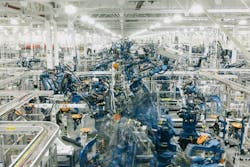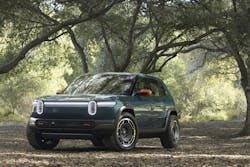Electric vehicle startup company Rivian has delayed the launch of a $5 billion plant in Georgia, possibly for several years.
Buried more than 1,000 words deep in a 1,200-word press release, Rivian mentioned that its new, smaller sport utility vehicles the R2, R3 and R3X will come off the assembly lines it already operates in Normal, Illinois. Expanding production at that plant “significantly reduc[es] the amount of capital needed to bring R2 to market,” the company noted, adding that operating one plant instead of two “reduces risk to the launch and associated ramp.”
The company estimates that it will save $2.5 billion squeezing the three new vehicles out of Illinois instead of adding capacity in Georgia. As to when it will resume construction there, company officials said, “The timing for resuming construction is expected to be later to focus its teams on the capital-efficient launch of R2 in Normal, Illinois.”
Rivian plans to launch the R2 in the first half of 2026, so if the automaker waits for the full launch of the new vehicles, Georgia could be on hold for another two years at least.
Construction has yet to begin on the plant site about 45 miles east of Atlanta. Residents near the site sued state and county agencies, complaining of zoning violations for the massive facility. Late last year, company and local officials had settled most of those challenges, clearing the way for infrastructure activities at the site.
The decision to cut spending by shifting production to the existing facility (a former Mitsubishi/Chrysler joint venture that produced vehicles such as the Eagle Summit and Mitsubishi Galant), will expand capacity there. Late last year, Rivian officials said Normal would eventually have the capacity to build 150,000 cars per year. Rivian now expects to boost that figure by more than 40% to 215,000 vehicles per year.
As recently as November, Rivian had been expressing optimism for 2024, raising its sales and production outlook. But, by February, it had changed its tune, broadcasting job cuts and focusing on fiscal discipline. Executives blamed high interest rates for a slowdown in vehcile orders.
About the Author
Robert Schoenberger
Editor-in-Chief
LinkedIn: linkedin.com/in/robert-schoenberger-4326b810
Bio: Robert Schoenberger has been writing about manufacturing technology in one form or another since the late 1990s. He began his career in newspapers in South Texas and has worked for The Clarion-Ledger in Jackson, Mississippi; The Courier-Journal in Louisville, Kentucky; and The Plain Dealer in Cleveland where he spent more than six years as the automotive reporter. In 2014, he launched Today's Motor Vehicles (now EV Manufacturing & Design), a magazine focusing on design and manufacturing topics within the automotive and commercial truck worlds. He joined IndustryWeek in late 2021.


